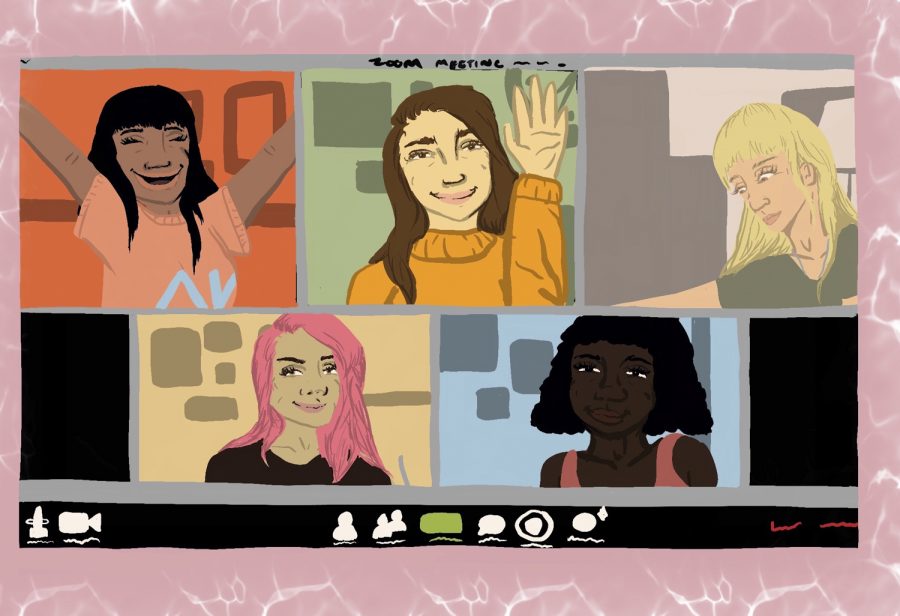Greek community responds to pandemic
Greek members can receive contact tracing amnesty through CORE
Greek chapters must do non-social events virtually because of CORE. The COVID-19 Organization Response Expectations document outlines guidelines for sorority and fraternity members to follow so they comply with COVID-19 guidelines. Non-social events that cannot be done virtually require masks and social distancing.
September 17, 2020
Greek chapter facilities are required to follow COVID-19 guidelines set forth by the state and Greek councils and may be liable to a conduct review process if an alleged violation is reported.
The Interfraternity Council, Panhellenic Council and Multicultural Greek Council developed a COVID-19 Organization Response Expectations (CORE) document to help prevent the spread of the virus, said Farrin Johnson, Panhellenic Council vice president of public relations.
All Greek members received a briefing on CORE. She said the document is not meant to scare the members, but to encourage them to comply with COVID-19 guidelines.
“The main reason for CORE is for the health and safety of our community members,” she said, “and make sure that people are reaching out for medical help and getting tested when they need to.”
Since the Greek chapter facilities, or houses, are privately owned, each facility can decide whether or not to remain open this fall, Johnson said. However, each chapter must comply with its respective national headquarters’ guidelines as well.
Greek houses that chose to remain open this semester had to submit a plan to the Center for Fraternity and Sorority Life, she said. The plan had to include measures addressing situations if members in the facilities get sick. The houses have to follow CORE guidelines as well.
The facilities are not at full capacity. Johnson said each Greek chapter gets to decide how many people it will allow to live in its facility.
Because of CORE, Greek chapters are under supervised probation, Johnson said. Social events are prohibited. Non-social events, such as chapter meetings, should be done virtually.
If a non-social event cannot be done virtually, such as a service project, participants are required to wear masks and practice social distancing. Non-social events cannot have more than 10 people, she said.
Contact tracing amnesty is available through CORE, she said. If a student violates CORE, the members can receive amnesty by communicating with a contact tracer, getting tested, and isolating.
Johnson said Greek members and chapters who violate CORE and do not go through the process to receive amnesty will undergo a conduct review through the Greek Standards Board.
“We just want our members to feel empowered to step up and actually be following these guidelines and also be holding each other accountable,” she said.
Pullman Police Chief Gary Jenkins said an infraction is issued if an officer determines there is a violation of the Nuisance Party Ordinance. So far, the Pullman Police Department has issued 22 infractions. Twenty were issued on College Hill, one at Military Hill and another at Sunnyside Hill.
One of the most recent infractions occurred Sept. 10. Sigma Alpha Epsilon hosted a party with more than 10 people, Jenkins said.
“The host received the infraction, and so now he has the option of going to court and paying the fine or plead not guilty and have a hearing,” he said.
Infraction fines have increased from $150 to $250 for the first offense, according to The Daily Evergreen. Individuals will be fined $500 for second violations. Fines will be issued to party attendees as well.
Jenkins said WSU submits record requests to Pullman PD for cases that involve WSU students.
Depending on the alleged violation, a case may be reviewed by the Center for Community Standards, said Jill Creighton, WSU dean of students and associate vice president of student affairs.
“Depending on the nature of the violation, it could either go to one of our student conduct officers or it could go to the university conduct board,” she said. “It’s dependent on the level of the egregiousness in the situation.”
If the case goes to the university conduct board, members will then decide if a violation occurred and what the repercussions should be, Creighton said. Reported students will be notified of the alleged violations and will be briefed about their rights and responsibilities during the conduct review process.
People can report violations of COVID-19 guidelines on the Center for Community Standards’ website. Creighton said individuals can report anonymously. However, people are encouraged to share their name and contact information on the report if additional information is needed.
“The primary goal is to encourage people to comply with guidelines and change people’s behavior,” she said.

















